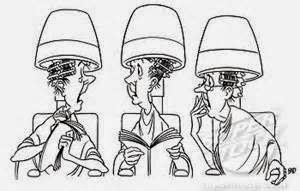As a rule of
thumb, in seminars and classrooms and from agents to editors, writers are often
warned not to use clichés. And while I can certainly understand the fallacy,
there lurks within me an infrequent bout of Contrary Mary.
I could argue
till the cows come home that we’ve heard phrases our entire lives, many from
beloved family members, many more from respected mentors; an indelible
arrangement of words that happen to precisely define your own thoughts and take
up roots in your heart to boot. In
which case, the occasional sharing of said phrase could be considered an imitation;
the most sincere form of flattery, or could quite possibly, low and
behold, be the most profound combination of words your readers have ever read.
That being
said, a certain amount of jurisprudence must be employed so as to never give
the devil a ride for he’ll always want to drive and your manuscript could be dropped
like a hotcake! But if a particular
phrase defines you, explains the mindset of your character, or perhaps
describes a setting or event, by all means, use it!
As long as
your work isn’t riddled with clichés (as I’ve demonstrated here), a good book
praises itself and that’s just right as rain, isn’t it?
I suppose I’ve
tortured the Literary Police long enough, but does anyone know how many phrases
I’ve coined? Do you have a favorite or least-favorite saying?
Incidentally,
in the course of this I learned the meaning behind the phrase SwanSong, which I didn’t know was a phrase, and found it to be both lovely
and tragic. But I’ll let you decide.



